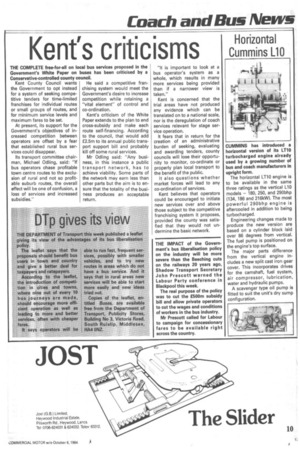Kent's criticisms
Page 21

If you've noticed an error in this article please click here to report it so we can fix it.
THE COMPLETE free-for-all on lo Government's White Paper on Conservative-controlled county c Kent County Council wants the Government to opt instead for a system of seeking competitive tenders for time-limited franchises for individual routes or small groups of routes, and for minimum service levels and maximum fares to be set.
At present, its support for the Government's objectives of increased competition between operators are offset by a fear that established rural bus services could disappear.
Its transport committee chairman, Michael Odling, said: "If bus operators chase profitable town centre routes to the exclusion of rural and not so profitable suburb routes, the overall effect will be one of confusion, a loss of services and increased subsidies." cal bus services proposed in the buses has been criticised by a ouncil.
He said a competitive franchising system would meet the Government's desire to increase competition while retaining a "vital element" of control and co-ordination.
Kent's criticism of the White Paper extends to the plan to end cross-subsidy and make each route self-financing. According to the council, that would add £2.5m to its annual public transport support bill and probably kill off some rural services.
Mr Odling said: "Any business, in this instance a public transport network, has to achieve viability. Some parts of the network may earn less than other parts but the aim is to ensure that the totality of the business produces an acceptable return. "It is important to look at a bus operator's system as a whole, which results in many more services being provided than if a narrower view is taken."
Kent is concerned that the trial areas have not produced any evidence which can be translated on to a national scale, nor is the deregulation of coach services relevant for stage service operation.
It fears that in return for the creation of an administrative burden of seeking, evaluating and awarding tenders, county councils will lose their opportunity to monitor, co-ordinate or properly plan local transport to the benefit of the public.
It also questions whether market forces will lead to any co-ordination of services.
Kent believes that operators could be encouraged to initiate new services over and above those subject to the competitive franchising system it proposes, provided the county was satisfied that they would not undermine the basic network.




























































































































































